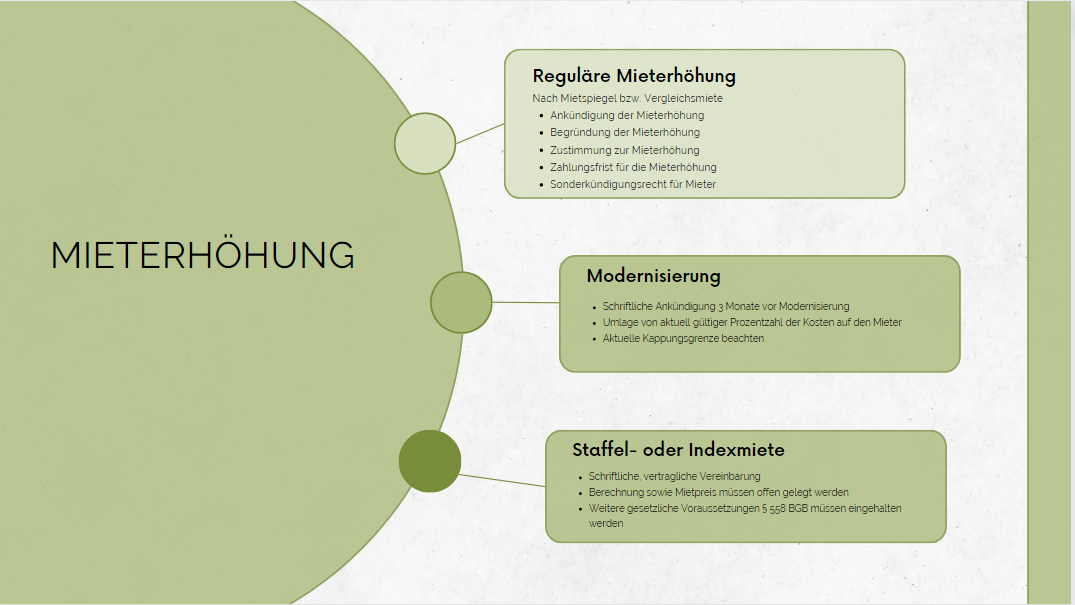Nördlingen Local Court, 27.01.2017, Ref.: 2 C 799/14
In contrast to a mere maintenance measure, the modernisation of the flat has the fundamental advantage for the landlord that the value of the property increases and that an increased rent can be demanded from the tenants after the modernisation. However, the annual rent increase in accordance with Section 559 BGB may not exceed 11% of the costs incurred for the modernisation of the flat.
According to Section 554 BGB, the landlord must give his tenant written notice of a planned modernisation at least 3 months before it begins. If the landlord intends to modernise in several stages, this must be clearly stated in the modernisation announcement (Section 555c (1) BGB).
The (re)usability of the flat by the tenant and the actual (energy-related) improvement determine when the modernisation measure has been completed within the meaning of Section 559 (1) BGB, whereby the specific benefit or an increase in the residential value of the individual tenant is irrelevant. Rather, the ecological objective of the modernisation measure - (e.g. sustainable energy savings) - must have been achieved.

Facts of the Case:
New landlord demanded higher rent due to modernisation measures
The case discussed here involved a rented flat in a property that had changed hands. One year before the sale of the property, the owner had announced extensive modernisation measures to save heating energy, which would take several months.
After the property had changed hands, the new owner, i.e. the plaintiff, demanded a higher rent from the tenants, including the defendant. The reason given was that the energy modernisation measures had now been completed.
Tenant was of the opinion that the modernisation measures had not been completed
The defendant denied that the work on the modernisation measures had been completed and refused to pay a higher rent for this reason. The landlord therefore sued the tenant.
Judgement of the district court of Nördlingen:
The new owner can also demand an increase
The Nördlingen Local Court dismissed the claim. As the legal successor of the former owner, the plaintiff could generally assert the rent increase in accordance with Section 559 (1) BGB, even if the defendant first became aware of the legal succession in the rent increase letter.
However, modernisation measures must be fully completed
In the present case, however, the request for a rent increase was invalid due to the modernisation measures not having been fully completed, meaning that the rent could not be increased. It is already clear from the wording of the provision in Section 559 (1) BGB that the landlord can only assert a rent increase after the modernisation measures have been fully completed (see BGH, NJW 2015, 934 on completed partial modernisations; Spielbauer/Schneider-Schneider, Mietrecht, Section 559a marginal no. 21).
The modernisation measure was therefore not yet fully completed - even if only to an extent of 5-8 % - so that an increase in rent pursuant to section 559(1) BGB in conjunction with section 559b(1) BGB was ruled out.
Source: Nördlingen Local Court
Important Note: The content of this article has been prepared to the best of our knowledge and belief. However, due to the complexity and constant evolution of the subject matter, we must exclude liability and warranty. Important Notice: The content of this article has been created to the best of our knowledge and understanding. However, due to the complexity and constant changes in the subject matter, we must exclude any liability and warranty.
If you need legal advice, please feel free to call us at 0221 - 80187670 or send us an email at or send an email to info@mth-partner.de info@mth-partner.de
Lawyers in Cologne provide advice and representation in tenancy law.




